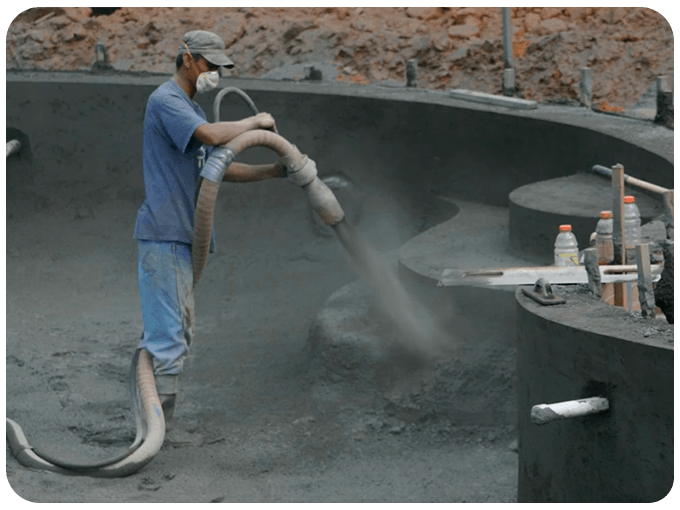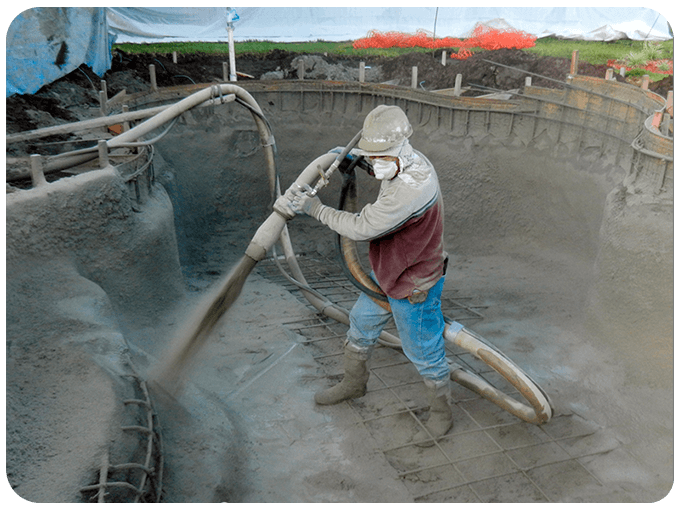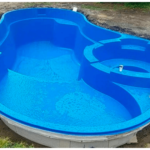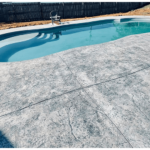Gunite pools are popular for their versatility in shape, as well as their durability. Because of this, gunite is the most common type of pool seen in many resorts and now in homes.
Table of Contents
What is Gunite?
Gunite is made of sand, water, and cement, and is basically the same as regular concrete, with one important exception. Unlike traditional concrete, which is poured in sections into wooden frames, gunite is applied in layers using a specialized spray gun. This means gunite surfaces do not have seams like traditional poured concrete, and this makes gunite pools extra durable.
Because it is applied with a compressed air “gun,” builders can spray concrete on vertical or curved surfaces. In addition to being a popular choice for building inground pools, gunite is also widely used in things like road tunnels.

Gunite Pool Installation
Installation of your new pool will begin with excavation of the pool shape and installation of iron rebar. The rebar frame creates a grid around the perimeter of your pool and/or spa to reinforce the structure. You’ll start to see your vision come to life as your pool builder sprays a thick layer of gunite around the rebar. Next, the gunite is smoothed out and left to cure.
Once set, the finish of your pool will be applied to your custom-designed backyard. Plaster is the most common finish due to its wide range of color options to match your pool landscape. If you’re interested in a more luxurious and unique look, having a pebble finish or mosaic may be more your style. Don’t be afraid to mix and match! Adding tile accents to your plaster finish can create interest and add a pop of color.
Maintaining Your Gunite Pool
As a proud gunite pool owner, there are a few things to keep in mind when maintaining this addition:
- Due to its porous surface, your pool will be more prone to algae growth. To counteract this, you’ll use more chemicals and filtration, along with brushing your pool more frequently to remove algae.
- Gunite and shotcrete pool surfaces may need refinishing. Unlike, for example, fiberglass or vinyl-lined pools, gunite and shotcrete will eventually show signs of wear. To keep the surface smooth and attractive, you’ll eventually need to refinish your pool surface, which means adding a new layer of finish. On the other hand, your gunite pool will never lose its shape like its vinyl or fiberglass counterparts.
And remember, whether you have a concrete pool, fiberglass pool, vinyl-lined pool, or any other type of inground pool, routine pool care including things like water testing and chemical addition, surface cleaning and scrubbing, and filter cleaning and maintenance will keep your pool in excellent shape.

Frequently Asked Questions about Gunite Pools
What is the difference between gunite and shotcrete?
Gunite and shotcrete are basically the same, and both are applied using a spray “gun,” making them ideal for curves, freeform designs, and unusual shapes. The gunite process is virtually the same as the shotcrete process. The only real difference between gunite and shotcrete is how and where it is mixed: gunite arrives dry and is mixed with water on-site just before spraying. Shotcrete, on the other hand, arrives pre-mixed.
Is gunite the same as concrete?
Yes and no. Gunite is made from the same basic ingredients as concrete (sand, cement, and water) but is applied in a different way: traditional concrete is poured in sections, resulting in “joints” where the sections meet. Gunite is sprayed using a specialized “gun,” resulting in seamless layers. The lack of seams makes a gunite pool more resilient than a concrete pool.


